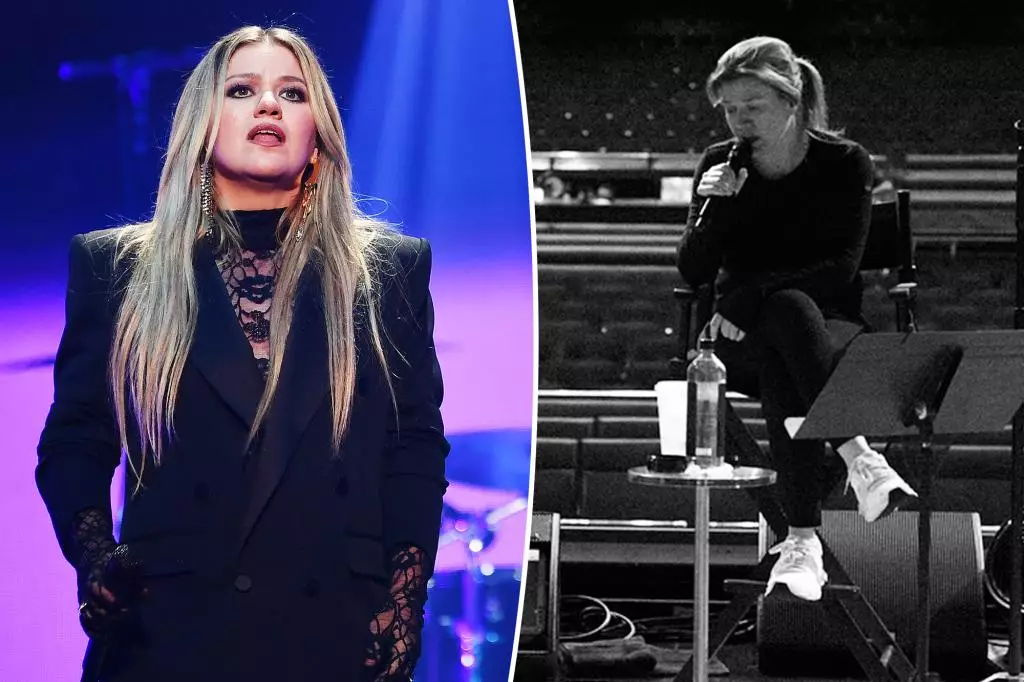Kelly Clarkson’s unexpected decision to pull out of her Las Vegas residency has sent shockwaves through her team, her fans, and the entertainment industry at large. What appeared as a straightforward step in her career suddenly unraveled into a web of disappointment, frustration, and questions. For the crew and fans, the last-minute cancellation was not just a logistical hiccup; it was a profound disappointment that exposed deeper issues within Clarkson’s personal and professional life.
The crew members, who are the unseen backbone of live performances, found themselves blindsided—kept entirely in the dark until the moment they learned the news, often via social media. This lack of communication is more than just unprofessional; it reflects a broader disconnect and perhaps a pattern of neglect that undermines trust and respect. This incident underscores how the human element—those who work tirelessly behind the scenes—often bears the brunt of stars’ unpredictable decisions, especially when lacking transparency. Clarkson’s failure to communicate promptly not only damaged her reputation among her team but also eroded the respect she once commanded.
Fan reactions were equally heartbreaking. Many had traveled long distances, some internationally, with hopes of experiencing her once-in-a-lifetime performances. Their emotional responses—tears, frustration, and feelings of betrayal—highlight a vital truth about celebrity interactions: fans invest more than money; they invest hope, expectation, and loyalty. When those expectations are shattered at the last minute, it leaves a scar that can be difficult to heal. Clarkson’s apparent insensitivity in how she handled the cancellation, especially by not giving her audience adequate notice, is a testament to how the personal can become a public relations disaster.
The Personal Toll and the Hidden Battles
While the public narrative fixates on the logistical chaos, the underlying issues shaping Clarkson’s recent decisions are more complex and deeply personal. Reports suggest that her voice, her most valuable asset, has been under significant strain. Clarkson’s admission that her rehearsals have “taken a toll” on her vocal cords hints at a high-stakes balancing act—striving for professional excellence while risking long-term damage. This reveals a harsh reality: the immense pressure to perform at perfection can come at a steep personal cost.
Further complicating her situation is her tumultuous personal life. Clarkson’s struggles, including her 2020 divorce from Brandon Blackstock, have been public and emotionally draining. The weight of personal battles often spills over into professional responsibilities, especially for artists who are as emotionally invested in their craft as Clarkson. It’s telling that she has missed several engagements, citing personal matters, which hints at ongoing struggles that might not always be visible. Such challenges can diminish the mental and physical resilience needed for a grueling schedule, particularly when the stakes are high and expectations are even higher.
Her recent withdrawal from her residency can be seen as a necessary—and perhaps brave—step to prioritize her health and well-being. Yet, the way this decision has been communicated, with limited notice, suggests a disconnect between her realities and her public image. It raises questions about how much of her internal struggle she chooses to reveal and how much remains hidden beneath the surface.
The Broader Implication for Stardom in the Modern Era
This incident with Clarkson exemplifies a broader trend in modern celebrity culture—where the personal is increasingly intertwined with the professional, often with unpredictable consequences. Fans want authenticity and transparency, but stars are also human beings with limits, vulnerabilities, and personal battles that they are reluctant to air publicly. Clarkson’s situation uncovers a fundamental tension: the pressure to perform flawlessly versus the undeniable reality of human frailty.
Moreover, the fallout emphasizes how important effective communication is in maintaining trust. Disappointing loyal audiences or caring team members by canceling last-minute or without adequate notice can irreparably harm a star’s reputation. Clarkson’s case is a reminder that in the age of social media, insiders within the industry must navigate their vulnerabilities carefully, balancing authenticity with professionalism.
Finally, it invites a reflection on the often unrealistic expectations placed on public figures to seem invincible. No matter how talented or successful an artist is, they are susceptible to burnout, health issues, and personal crises. Recognizing and respecting these limits—not just for their sake but for the sustainability of their careers—is crucial. Clarkson’s candidness about her vocal health and personal struggles signals some growth in this regard, but her handling of the recent cancellations demonstrates that there’s still a long path toward genuine transparency and self-care.
—
This episode should serve as a wake-up call—not just for Clarkson but for the industry—which often demands perfection at the expense of compassion and understanding. Her story underscores the importance of humanizing celebrities, acknowledging their vulnerability, and respecting their boundaries—lessons that, when embraced, could foster a healthier, more empathetic entertainment landscape.

